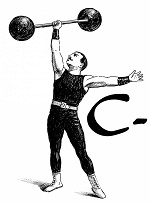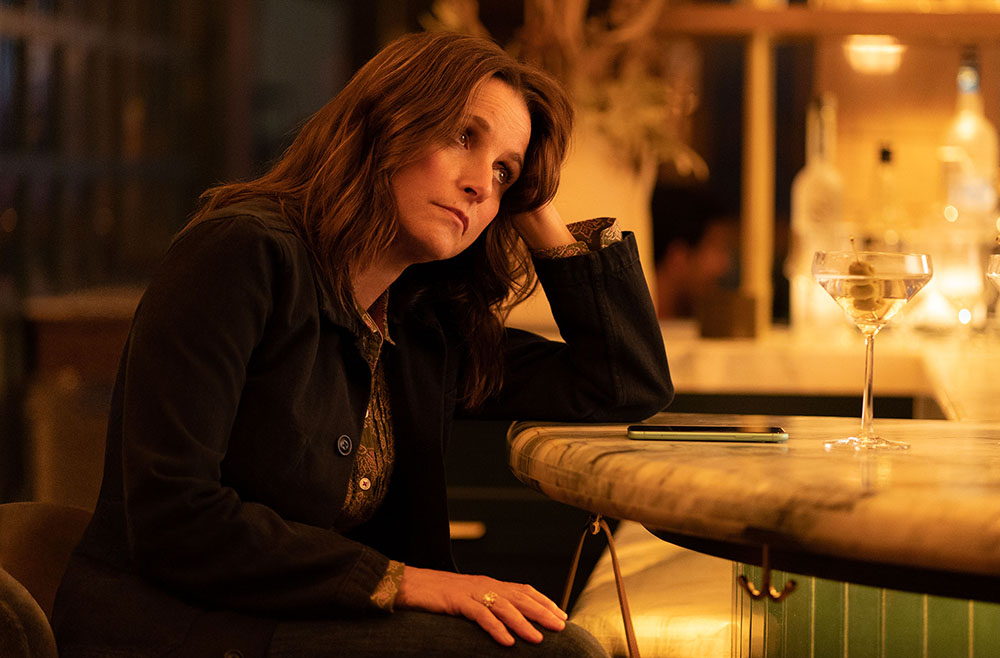Nicole Holofcener’s return to the big screen, “You Hurt My Feelings,” has moments that call back to her best work, “Walking and Talking,” and charming performances by Julia Louis-Dreyfus and Tobias Menzies. Regardless, the majority of this dramedy captures uninteresting depictions of little white lies in an old-hat melodramatic fashion.
Director-screenwriter Nicole Holofcener is known for creating “easy-breezy” comedies that explore the array of humanistic calamities (whether a divorce in “Enough Said” or success in “Friends with Money”) in a humoristic manner. Occasionally, bright, lovely, and pleasant moments hit the spot in which Holofcener’s writing excels. However, when you look at the projects in their entirety, something is lacking in the “impact” department. Once you finish one of her films, you remark, “ok, that was nice,” yet the cinematic experience ends there, unfortunately. Out of her entire filmography, the film I have enjoyed the most is the Catherine Keener and Anne Heche-led “Walking and Talking” (1996). In that film, we see Holofcener at her best in screenwriting and directing (in my honest opinion). The primary reason why I think so is because she writes her most relatable and complex characters to date there.
Reuniting Julia Louis-Dreyfus with Nicole Holofcener
They feel as if they are actual human beings and not living in a “movie world.” It is a fictional state where everything (every action, feeling, reaction, amongst other scenarios or sensations) feels “too good to be true.” I dislike comedies wanting to act grounded when the events transpiring are too convenient for the characters. And this happens plenty when Holofcener is at her weakest state. Since then, none of Holofcener’s films have reached the greatness of “Walking and Talking.” Her latest, “You Hurt My Feelings” (which had its premiere at this year’s Sundance Film Festival), has moments that capture her strengths and reach the 1996 feature’s quality. Nonetheless, most of its run-time covers uninteresting topics in trite, melodramatic fashions. At least the performances by Julia Louis-Dreyfus and Tobias Menzies hold this slowly sinking ship afloat in it is at its weakest.
“You Hurt My Feelings” stars Julia Louis-Dreyfus (who has worked with Nicole Holofcener before in 2013’s “Enough Said,” co-starring the late James Gandolfini) as successful novelist Beth. She’s struggling to find her scripture footing during her first attempt at fiction after her acclaimed memoir. Her therapist husband, Don (Tobias Menzies), is also struggling with his career — failing to concentrate during his patient’s sessions and connect with them. As a result, he’s unable to console or deliver insight to them, causing him to feel out of his game. What would be the reason for it? While things might not go their way in their professional endeavors, their love life remains intact. They share everything except one thing. Don has been keeping a secret from Beth that might “hurt her feelings” (*wink* *wink*). A little white lie paves the way for confrontations about their marriage and the years they have spent together.
Some Predictability but Still Enjoyable Performances
The key word in “Your Hurt My Feelings” is “seem.” In the beginning, everything seems to be the way it should be. Although there are some struggles in the work-life scenario, the rest is utterly perfect. However, there are some twists and turns, lies that we keep from one another, so we don’t make others feel bad. The narrative turns Holofcener’s latest makes are not only predictable but uninteresting and lacking in broadened exploration. This is due to the film’s focus on very niche people and their luxury milieu. It makes way for a narrative lacking relatability and humanistic expressions because it seems detached from reality. Like “Ticket to Paradise,” this film is set in a different version of planet Earth.
While the Julia Roberts and George Clooney-led rom-com is set in a world where everything and everyone is beautiful, this dramatic comedy about marriage and its miscommunication is placed in the same New York as in “Serendipity” (2001). Everyone in this version of New York goes through the same emotions. And if that isn’t the case, they all react similarly. What’s the reaction? Overarching and too-witty-for-its-own-good way, which annoys me a bit mostly when its two leads are separated on-screen. However, when Louis-Dreyfus and Menzies appear together, things are pretty different. Their chemistry is palpable, although the script isn’t doing any favors to them due to its constant inclination toward risible melodrama. It gets to the point where you think they have worked with each other multiple times. Nevertheless, Louis-Dreyfus and Menzies’s performances keep this film slightly enjoyable throughout most of its run-time.
Obviously, the best scenes in the movie revolve around their discussions, and it is because of their comedic timing rather than the lines that pivot from naturalistic to cinematic. This back-and-forth causes you to not believe in the characters due to their departure from reality. Of course, there is an audience who would enjoy this type of film. I won’t deny that I’m not the target audience for this picture. Many will find its comedy howl-inducingly hilarious. In addition, some may even embrace its departure from grounded conversations to ones that might not reflect relatable emotions perfectly but give you a sense of warmth. And that is a compliment that I can provide to Holofcener’s screenplay. She is great at delivering a warm hug to the audience watching.
Some Lack of Comedy and Blank Margins
Add that to her knack for getting good performances out of her cast, and you might have an enjoyable feature worthy of venturing into. Some nice jokes and witty remarks made me chuckle, so it gets more points than other films tackling similar topics. Regardless, the film has several open spaces of approximately fifteen to twenty minutes where I didn’t feel the urge to laugh. “You Hurt My Feelings'” old-hat depictions of little white lies got in the way of its comedic sensibilities. Those spaces could have been forgiven if they had left food for thought or contemplation. Though they are just blank margins with no wit or substance. In the end, I have seen this film in a thousand other versions from this perspective. This one isn’t one of the worst I have seen (not even close to being it).
Yet, it is still a disappointing return from a filmmaker I once deemed promising. I wish she would surprise me one day with something that reaches the likes of “Walking and Talking.” I guess that should wait for another day. “You Hurt My Feelings” might have some moments where it showcases Holofcener-best potential but immediately falls flat on its face when substantially touching its themes.

Sundance Film Festival concluded on January 29th, 2023. Follow us for continuing dispatches, reviews, capsules, and wrap-ups over the next few days.


